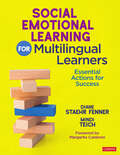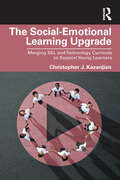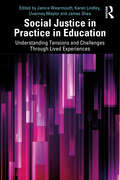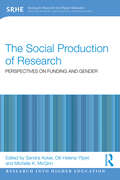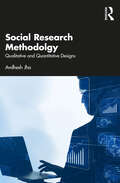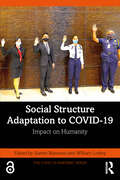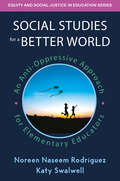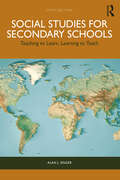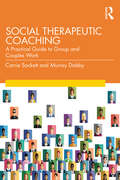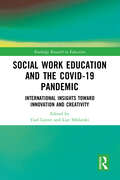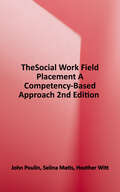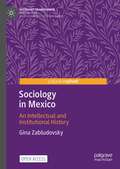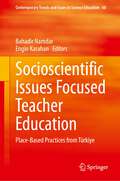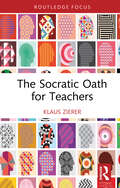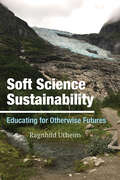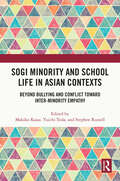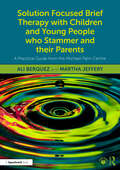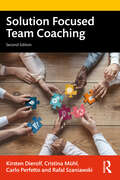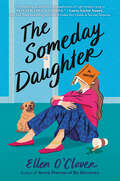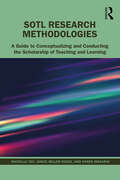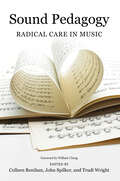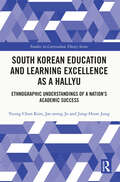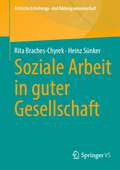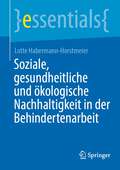- Table View
- List View
Social Emotional Learning for Multilingual Learners: Essential Actions for Success
by Diane Staehr Fenner Mindi TeichFoster multilingual learners’ academic success, wellbeing, agency, and belonging Though multilingual learners (MLs) comprise nearly 25% of the school-age population, the most widely-used social emotional learning (SEL) frameworks and programs lack an intentional focus on these students’ unique strengths and challenges. To foster MLs’ academic success and wellbeing, educators must consider students’ cultures, languages, assets, expectations, norms, and life experiences when integrating SEL practices. In this groundbreaking book, Dr. Diane Staehr Fenner and Mindi Teich break down how each of the five competencies in the Collaborative for Academic, Social, and Emotional Learning (CASEL) SEL framework can be implemented with ML success in mind. Staehr Fenner and Teich’s practical and engaging guide provides SEL considerations that are unique to MLs, relevant research, easy-to-implement educator actions, and tools to seamlessly integrate SEL practices into content and language instruction. Additional features include: Tools and practical strategies educators can apply immediately Programmatic and systemic considerations that impact SEL for MLs Examples of successful SEL strategies for MLs currently being used in classrooms Ample opportunities for reflection and application in each chapter Templates to prioritize and integrate SEL for MLs into teaching practices MLs thrive when they are validated and supported to achieve their goals, empathize with others, build relationships, and make responsible decisions. The essential actions presented in this guide will enable you–regardless of your role or prior experience with SEL–to empower MLs to achieve academic and lifelong success.
Social Emotional Learning for Multilingual Learners: Essential Actions for Success
by Diane Staehr Fenner Mindi TeichFoster multilingual learners’ academic success, wellbeing, agency, and belonging Though multilingual learners (MLs) comprise nearly 25% of the school-age population, the most widely-used social emotional learning (SEL) frameworks and programs lack an intentional focus on these students’ unique strengths and challenges. To foster MLs’ academic success and wellbeing, educators must consider students’ cultures, languages, assets, expectations, norms, and life experiences when integrating SEL practices. In this groundbreaking book, Dr. Diane Staehr Fenner and Mindi Teich break down how each of the five competencies in the Collaborative for Academic, Social, and Emotional Learning (CASEL) SEL framework can be implemented with ML success in mind. Staehr Fenner and Teich’s practical and engaging guide provides SEL considerations that are unique to MLs, relevant research, easy-to-implement educator actions, and tools to seamlessly integrate SEL practices into content and language instruction. Additional features include: Tools and practical strategies educators can apply immediately Programmatic and systemic considerations that impact SEL for MLs Examples of successful SEL strategies for MLs currently being used in classrooms Ample opportunities for reflection and application in each chapter Templates to prioritize and integrate SEL for MLs into teaching practices MLs thrive when they are validated and supported to achieve their goals, empathize with others, build relationships, and make responsible decisions. The essential actions presented in this guide will enable you–regardless of your role or prior experience with SEL–to empower MLs to achieve academic and lifelong success.
The Social-Emotional Learning Upgrade: Merging SEL and Technology Curricula to Support Young Learners
by Christopher J. KazanjianThe Social-Emotional Learning Upgrade explores how today’s educators can connect two previously separated but important curricula in their schools: social-emotional learning (SEL) and educational technology. With schools’ SEL efforts pressed for time and resources and digital engagements often limited to skill development, K-12 students risk being unprepared to sustain their well-being and personal opportunities in a rapidly changing, technology-dependent world. Driven by a paradigm that synthesizes multicultural education and humanistic psychology, this book readies educators to implement SEL curricula that will support young learners as they navigate constant social and technological flux and that will nurture their unique perceptions of reality, their aspirations, and their mental and physical health. Each chapter’s novel insights will help to mitigate both student disengagement and teacher demoralization, enabling classroom pedagogies and the process of schooling to better align with the ways in which learners explore, express, and create meaning. Guiding pre-service teachers, leaders, and curriculum developers beyond common goals such as digital skills development, content mastery, or standardized testing, this volume focuses instead on complex digital literacies, collaborative experiences, problem- and project-based learning, culturally relevant pedagogies, and overall holistic growth.
Social Justice in Practice in Education: Understanding Tensions and Challenges Through Lived Experiences
by Janice Wearmouth Karen Lindley Uvanney Maylor James SheaExploring Social Justice in Practice in Education focuses on the tensions and challenges to issues of fairness and social and cognitive justice in the sphere of education. The terms ‘fairness’ and ‘social and cognitive justice’ are often used to justify particular policies and practices in the sphere of education. In providing a clear definition of what they should mean in practice, this book includes a discussion of, and, in some cases, potential resolutions to, tensions and challenges in relation to notions of fairness, and social and cognitive justice that are implicit within individuals’ lived experiences across all phases of education. Through their personal narratives, the authors illustrate how such tensions and challenges have played out in their own lives. They go on to explore differences in interpretations and consequent challenges in putting concepts of social justice into practice. Chapters consider important implications across different sectors and phases of education, including special educational needs, leadership and higher education. This insightful volume will enable educators, at all levels, to hear from students, family members, significant adults/carers and professionals, their experiences of fairness and social justice in education, and about what could be done in the future to redress injustices. It will appeal to readers at all levels in education including those studying for or teaching Education-related degrees at bachelors’, masters’ and doctoral levels.
The Social Production of Research: Perspectives on Funding and Gender (ISSN)
by Sandra Acker Oili-Helena Ylijoki Michelle K. McGinnThe Social Production of Research offers critical perspectives on the interrelations between research funding and gender, in a climate where universities expect accountability and publishing productivity to be maintained at peak levels.Drawing upon a range of qualitative methods, contributors investigate experiences with research funding; the nature of institutional, funding body and country contexts; and the impact of social change and disruptions on research ecosystems and academic careers in Canada, Finland, Sweden and the UK. Nuanced accounts call attention to the social, emotional and political conditions within which research is produced, while identifying the ways academics enact, shape, negotiate and resist those conditions in their everyday practice.Featuring thought-provoking and critical insights for an international readership, this volume is an essential resource for researchers, academics, administrators, managers, funders, politicians and others who are concerned about the future of research funding and the importance of gender equity.
Social Research Methodology: Qualitative and Quantitative Designs
by Avdhesh JhaThis book provides unrivalled coverage of both quantitative and qualitative research methods, making it invaluable for anyone embarking on social research. Divided into five parts/sections, it introduces tools, techniques, critical aspects and knowledge of conducting social research, which include a detailed discussion about the basics of social research, social research problem, review of literature, hypothesis, sampling, research design, tools of research, statistics and report writing. The volume helps acquire knowledge, develop an understanding, apply the concepts in social research and curate checklists and rating scales designed to evaluate the statement of a problem, research proposal, hypothesis, different methods of research and writing research reports. It also includes a brief discussion about statistics, the style of reporting and the criteria for evaluating social research. This book will be a helpful reference/text for graduates, postgraduates, doctoral scholars and all those interested in societal development. It would also be useful to students, researchers and teachers of the various social sciences disciplines like psychology, sociology, education, social work and other allied subjects. It would be an invaluable companion to professionals and data scientists working in the field of analytics.
Social Structure Adaptation to COVID-19: Impact on Humanity (The COVID-19 Pandemic Series)
by Suresh Nanwani William LoxleySocial Structure Adaptation to COVID-19 offers global, interdisciplinary perspectives that examine how the COVID-19 pandemic has altered the development trajectory of schools, public health, the workforce, and technology adoption. It explores social themes in society, economy, policy, and culture and draws on a social framework to describe key functions of societal adaptation to the pandemic.Edited by Suresh Nanwani and William Loxley, the volume is grounded in the study of system components and their objectives to improve overall well-being given the ill effects of the COVID-19 pandemic. Chapters explore interconnected social networks and how sectors restructured themselves to stabilize or transform society. International contributors from 20 countries offer case studies that highlight key themes including personal connectivity, societal equality, well-being, big data, and national resilience. They predict how impactful the pandemic might be in reshaping the future and assess how the COVID-19 pandemic has affected school system shutdown, public health collapse, business closures, public policy failure, and technology-driven social media acceleration.Offering insights into how institutions and sectors work together in times of crisis, and how COVID-19 has restructured social behavior, Social Structure Adaptation to COVID-19 will be valuable reading for scholars and students of sociology, political science, anthropology, comparative international development, psychology, and education. It will also be of interest to policymakers concerned with education, work and organizations, and media and technology.The Open Access version of this book, available at www.taylorfrancis.com, has been made available under a Creative Commons Attribution-Non Commercial-No Derivatives (CC-BY-NC-ND) 4.0 international license.
Social Studies for a Better World: An Anti-Oppressive Approach for Elementary Educators (Equity and Social Justice in Education Series)
by Noreen Naseem Rodriguez Katy SwalwellPlan and deliver a curriculum to help your students connect with the humanity of others! In the wake of 2020, we need today’s young learners to be prepared to develop solutions to a host of entrenched and complex issues, including systemic racism, massive environmental problems, deep political divisions, and future pandemics that will severely test the effectiveness and equity of our health policies. What better place to start that preparation than with a social studies curriculum that enables elementary students to envision and build a better world? In this engaging guide two experienced social studies educators unpack the oppressions that so often characterize the elementary curriculum—normalization, idealization, heroification, and dramatization—and show how common pitfalls can be replaced with creative solutions. Whether you’re a classroom teacher, methods student, or curriculum coordinator, this is a book that can transform your understanding of the social studies disciplines and their power to disrupt the narratives that maintain current inequities.
Social Studies for Secondary Schools: Teaching to Learn, Learning to Teach
by Alan J. SingerNow in its fifth edition, this popular text for secondary social studies methods courses integrates discussions of educational goals and the nature of history and social studies with ideas for organizing social studies curricula, units, lessons, projects, and activities. Advocating an inquiry and activity-based view of social studies teaching that respects the points of view of students and teachers, it offers systematic support and open, honest advice for new teachers.Based in practice and experience, lesson ideas and materials in the book and online are designed to help new teachers address Common Core learning standards, to work in inclusive settings, and to promote literacy and the use of technology in social studies classrooms. Chapters include highlighted Learning Activities, Teaching Activities, and Classroom Activities designed to provoke discussion and illustrate different approaches to teaching social studies and conclude with recommendations for further reading. Features of the fifth edition include: Activities called "Think it over," "Add your voice to the discussion," "Try it yourself," and "It’s your classroom” at the end of each chapter New topics such as the 1619 Project controversy, Stop WOKE campaigns, academic freedom, and legal restraints on 7–12 teachers New content on teaching literacy, including writing, reading, media, computer, and oral literacies Approaches to teaching advanced placement, international baccalaureate, and dual enrollment classes Multi-disciplinary and project-based teaching that combines history and social studies with the social sciences and other academic disciplines Links to the NCSS 3-C framework Information on becoming a professional leader through involvement in organizations like the NCSS and teacher unions Designed for undergraduate and graduate pre-service social studies methods courses, this text is also useful for in-service training programs, as a reference for new social studies teachers, and as a resource for experienced social studies educators who are engaged in rethinking their teaching practice.This text is supported by online materials, including discussion questions, lesson ideas, and links to lesson materials and activity sheets. You can find the resources here: https://alansinger.net/social-studies-for-secondary-schools/
Social Therapeutic Coaching: A Practical Guide to Group and Couples Work
by Carrie Sackett Murray DabbyCombining social therapeutics with the practice of coaching, this book guides coaches and mental health professionals in how to coach groups and couples using this innovative method. Drawing from the authors’ combined 50 years of experience, Social Therapeutic Coaching: A Practical Guide to Group and Couples Work empowers practitioners to break away from focusing on individual change to focusing on groups and their emotional growth. Early chapters touch on the history of coaching and powerful discoveries of social therapeutics before diving into how to lead a social therapeutic group. Sackett and Dabby explain how to incorporate the concept of human relationality into coaching sessions, demonstrating how it extends group work beyond assembling like-minded individuals with similar goals into bringing together diverse people with diverse issues that they want to work on and grow around. It also brings a fresh lens to working with couples, in which the focus is on discovering what "the relationship" needs, rather than trying to get individuals to compromise, change or work towards a preconceived shared vision for an end goal. Written in an accessible style and filled with extensive case studies and examples, Social Therapeutic Coaching provides a powerful toolkit for coaches, counselors, psychotherapists, social workers, HR and talent development professionals, community-based leaders and social entrepreneurs.
Social Work Education and the COVID-19 Pandemic: International Insights toward Innovation and Creativity (Routledge Research in Education)
by Yael Latzer Liat ShklarskiThis book examines how the shift to remote teaching in March 2020 due to the global pandemic created new opportunities for innovation and creativity and shaped how social work classes were taught, with many temporary changes now part of permanent, standard practice. Drawing on narratives from 20 social work leaders across 17 different countries, the chapters explore particular themes and viewpoints on lessons learned during the pandemic, including case studies to examine copying mechanisms, insights into the transition to remote teaching, and the creative lessons that were learned. By taking an international perspective, it represents a key contribution to the scholarship of social work leaders from around the world concerning how institutions transitioned to remote learning and teaching and how these lived experiences and new discoveries are contributing to and influencing current practice. As such, it will appeal to social work educators, researchers, and field educators around the world with interests in experimental curriculum and field practice.
The Social Work Field Placement: A Competency-Based Approach
by John E. Poulin Selina Matis Heather WittThis book is designed to help BSW and MSW students enrolled in foundation field placements and field seminars structure their field placement learning around the nine Council on Social Work Education (CSWE) profession social work competencies defined in the 2022 Educational Policy and Accreditation Standards (EPAS). Our goal is to ensure that foundation field placement students integrate course learning related to social work competencies with their field placement learning experiences in a purposeful, reflective, and integrated manner. It focuses the field experience and learning opportunities on social work competencies. Each chapter is directly linked to a professional competency with substantive content on the competency, field reflection questions, critical thinking questions, a detailed case example illustrating one or more competencies with discussion questions, and electronic competency resource links to websites and videos.
Sociology in Mexico: An Intellectual and Institutional History (Sociology Transformed)
by Gina ZabludovskyThis open access book presents a condensed history of Sociology in Mexico from its origins, through to the middle of the 19th century and up to the present day. The book analyses the interaction between sociology and the main economic, political and social change in the country, including the 1910 Mexican Revolution, the main social movements, the role of the intellectual exiles from Spain and Latin America, and the participation of women, who have often remained invisible in the history of sociology. The book explores how sociological discourse played a fundamental role in the separation of secular and public education and the search for a ‘national project’ from 1868 onwards, despite the lack of an institute of social research until 1930; how sociology became an autonomous social science, led by a few intellectuals and public figures, as it became institutionalized in universities, and the effect this had on the development of the discipline; the influence of Marxism during the 1970s; and the progression from a process of specialization after the fall of the Berlin Wall to a new trend of working in collective projects with an increasing interdisciplinary perspective in the first decades of the 21st century.
Socioscientific Issues Focused Teacher Education: Place-Based Practices from Türkiye (Contemporary Trends and Issues in Science Education #60)
by Bahadir Namdar Engin KarahanThis book explores place-based pedagogies in the context of socioscientific issues in Türkiye. From local and global contexts, it delves into research-based learning activities for science teacher educators, offering insights to educators worldwide.The book aims to empower teachers to provide students with learning experiences centered on local socioscientific issues essential for developing scientifically literate citizens. Each chapter showcases effective practices, focusing on local topics like gold mining, nuclear power plants, and river pollution. By incorporating socioscientific elements into science lessons, teachers are encouraged to foster students’ responsibility values, argumentation, critical thinking, and awareness. Emphasizing the crucial components of place-basedness and relevancy of SSI learning environments, students are guided towards more sophisticated ways of conceptualizing and resolving SSI. The intended audience includes science teacher educators, researchers, and educators devoted to engaging students in meaningful socioscientific learning experiences.
The Socratic Oath for Teachers
by Klaus ZiererWhat makes a good teacher? In 1991, Hartmut von Hentig attempted to answer this when he first formulated a 'Socratic oath' for the profession, and it is a question which remains relevant today. In The Socratic Oath for Teachers, Klaus Zierer revisits and reframes the concept of a teacher’s oath while also addressing challenges currently facing our societal developments in recent didactic-methodological research and fresh perspectives on the goals of the teaching profession. Referencing Socrates throughout, this short think piece proposes a professional oath for teachers that at its core is fully committed to the successful education and well-being of students. Drawing upon key research and his own experiences within education, Zierer answers the following questions, establishing how a professional oath may support teachers: What is a professional oath, and what can it do? What characterises teacher professionalism? What can be understood by teacher attitudes? Why are they crucial for a successful professional oath? Why is Socrates suitable as a guarantor for a professional oath of teachers? Why is a renewal of the Socratic Oath necessary? For whom is an oath necessary, and what must it contain? In this fascinating work, Klaus Zierer explores the principles and goals of the teaching profession and formulates theoretically sound and empirically validated principles of successful teaching. This is an essential read for any teacher, senior leader, policy maker, educationalist, or researcher who wants to learn more about what makes a good teacher.
Soft Science Sustainability: Educating for Otherwise Futures
by Ragnhild UtheimThe central role of education in responding to climate change is noted by stakeholders of all kinds. Yet for education to act as a vehicle of change it must become more holistic, inclusive, critically reflexive, and transformative. Most critically, it must transcend the grip of Western hegemonic reasoning—of modern colonial habits of seeing, perceiving, relating, and structuring—as the only legitimate means of making sense of life and the earth we inhabit together. Because drivers of climate change involve multidimensional, intersecting anthropogenic processes that are at once global and local in scope and are often intimately personal in ways difficult to discern directly, educating to sustain the future will require competencies that exist beyond science and technological innovation. In Soft Science Sustainability, Ragnhild Utheim uses social cartography to explore the metacognitive, psychosocial, intercultural, collaborative, and interactive systems dimensions of what it means to sustain our common future together. The 3C cartography examines the less tangible human behaviors, thoughts and emotions, worldviews, interdependencies, complexities, and dynamic adaptability that factor into climate change and its threats to human and other-than-human life on earth.
SOGI Minority and School Life in Asian Contexts: Beyond Bullying and Conflict Toward Inter-Minority Empathy
by Makiko Kasai Yuichi Toda Stephen RussellRepresenting an often overlooked population, this book explores the experiences of LGBTQ+ youth in Asian countries. Contributors focus on LGBTQ+ youth’s school life experiences, including bullying and violence, a pervasive and serious problem. This book aims to inform psychologists, mental health providers, and school professionals about the needs of LGBTQ+ youth from eight different Asian countries. Individual chapters present unique aspects of LGBTQ+ youth experiences in school contexts from different cultural perspectives. In addition, the intersectionality of LGBTQ+ and other minorities (including ethnicity, religion, and social class) highlights multiple sources of oppression or discrimination that can create additional pressures and stress for youth. The concepts of inter-minority conflict and inter-minority empathy are introduced to understand minority issues from new perspectives. This is a valuable reference for psychologists, social workers, counselors, nurses, mental health professionals, and students, whether preparing for general practice, treating LGBTQ+ clients, or supporting LGBTQ+ youth in schools around the world.
Solution Focused Brief Therapy with Children and Young People who Stammer and their Parents: A Practical Guide from the Michael Palin Centre
by Ali Berquez Martha JefferyThis book offers speech and language therapists, and other allied health professionals, a practical resource for working in a distinctive way with children and young people, and their parents, to achieve their ‘best hopes’ from therapy. The authors share a wealth of knowledge and experience from the Michael Palin Centre for Stammering about how they use Solution Focused Brief Therapy to enhance their practice. This resource manual: Provides a step-by-step guide to starting solution-focused conversations, having follow-up meetings, drawing attention to what’s working, and ending well. Illustrates work with a broad range of clients who stammer, including clients with additional physical, learning, and emotional needs. Demonstrates the benefits of working systemically with children and young people and their parents or carers. Supports therapists to develop skills in working collaboratively with clients on what they want to achieve from therapy. Gives examples of how to ask helpful questions and have hope-filled conversations. Considers the benefits and challenges of working in a solution-focused way. Describes how to adapt solution-focused conversations according to the client’s age and stage. Presents a range of applications of SFBT including in groups and in clinical supervision. The manual is illustrated by a rich variety of case examples which brings the material to life and enables the reader to apply the principles to their own setting. It is an essential practical resource for therapists hoping to develop their skills in empowering parents and in supporting children and young people towards living their best life.
Solution Focused Team Coaching
by Kirsten Dierolf Cristina Mühl Carlo Perfetto Rafal SzaniawskiSolution Focused Team Coaching offers readers a simple, practical and effective way to coach teams. Its evidence-based approach, which has been applied successfully to many fields, is presented in an engaging, pragmatic and approachable way, making this book a must read for anyone who wants to broaden their horizon within the team coaching space. This book presents the background and philosophy of Solution Focused team coaching and then moves on to explore its practical application in various formats of team coaching, with different audience dimensions. The reader will find a useful structure for team coaching processes as well as detailed descriptions for facilitating team coaching “moves” (conventionally called “techniques” or “tools”) for both online and live settings. With this book, it is easy to plan a Solution Focused team coaching process from contract negotiation through workshop design to follow-up and evaluation. It covers difficult team situations such as conflicts, and different forms of teams from shop-floor to executive teams, Agile teams and special formats of team coaching, as well as how to facilitate larger teams. Additionally, readers who want to achieve certification and/or accreditation will find it extremely useful to read about ICF, EMCC and AC team coaching competencies and how Solution Focused team coaching is an easy way of embedding those competencies. Solution Focused Team Coaching is a must for any coach, from those who would like to learn a pragmatic, impactful and easy way to move into team coaching to experienced team coaches who would like to learn a new approach and expand their skills, and anybody interested in exploring the fascinating world of team coaching.
The Someday Daughter
by Ellen O'CloverPerfect for fans of Rachel Lynn Solomon, Mary H. K. Choi, and Alex Light! From the critically acclaimed author of Seven Percent of Ro Devereux comes another heartrending and nuanced novel about family, love, and the cost of ambition.“A compelling, beautifully drawn exploration into complicated family and personal relationships and the frailty and fortitude of a girl simply trying to succeed, love, and thrive. I’m proud to live in a book world where Ellen O’Clover is writing contemporary young adult fiction. The Someday Daughter is a forever treasure.” —Laura Taylor Namey, New York Times bestselling author of A Cuban Girl’s Guide to Tea and Tomorrow Audrey St. Vrain has grown up in the shadow of someone who doesn’t actually exist. Before she was born, her mother, Camilla St. Vrain, wrote the bestselling book Letters to My Someday Daughter, a guide to self-love that advises treating yourself like you would your own hypothetical future daughter. The book made Audrey’s mother a household name, and she built an empire around it.While the world considers Audrey lucky to have Camilla for a mother, the truth is that Audrey knows a different side of being the someday daughter. Shipped off to boarding school when she was eleven, she feels more like a promotional tool than a member of Camilla’s family. Audrey is determined to create her own identity aside from being Camilla’s daughter, and she’s looking forward to a prestigious summer premed program with her boyfriend before heading to college and finally breaking free from her mother’s world. But when Camilla asks Audrey to go on tour with her to promote the book’s anniversary, Audrey can’t help but think that this is the last, best chance to figure out how they fit into each other’s lives—not as the someday daughter and someday mother but as themselves, just as they are. What Audrey doesn’t know is that spending the summer with Camilla and her tour staff—including the disarmingly honest, distressingly cute video intern, Silas—will upset everything she’s so carefully planned for her life.
SoTL Research Methodologies: A Guide to Conceptualizing and Conducting the Scholarship of Teaching and Learning
by Michelle Yeo Janice Miller-Young Karen ManarinCombining real examples with a roadmap of how to construct studies, analyze results, and share work, this book serves as a primary research methodology text for the field of Scholarship of Teaching and Learning (SoTL). The volume seeks to explore key aspects of SoTL that are often missing in past frameworks: research-based ontologies, epistemologies, and ethical axiologies. Chapters map out the expansive continuum of SoTL by detailing its history and key work while incorporating Indigenous perspectives on pedagogy and research methodologies. The text also features methods of qualitative and quantitative data generation essential for SoTL such as conducting interviews and focus groups, procuring data through questionnaires and artifact observation, and sharing results for dissemination in traditional and public scholarship. A comprehensive guide for conducting SoTL research, this book illustrates a broad array of contexts and a spectrum of research methodologies to expand, enrich, and support both novice and experienced SoTL practitioners and researchers in answering the contexts and questions at the heart of teaching and learning.
Sound Pedagogy: Radical Care in Music (Music in American Life)
by Molly M Breckling William Everett Kate Galloway Sara Haefeli Eric Hung Stephanie Jensen-Moulton Mark Katz Nathan A Langfitt Matteo Magarotto Mary Natvig Frederick A Peterbark Laura Moore Pruett Colleen Renihan Amanda Christina Soto John Spilker Reba A Wissner Trudi WrightMusic education today requires an approach rooted in care and kindness that coexists alongside the dismantling of systems that fail to serve our communities in higher education. But, as the essayists in Sound Pedagogy show, the structural aspects of music study in higher education present obstacles to caring and kindness like the entrenched master-student model, a neoliberal individualist and competitive mindset, and classical music’s white patriarchal roots. The editors of this volume curate essays that use a broad definition of care pedagogy, one informed by interdisciplinary scholarship and aimed at providing practical strategies for bringing transformative learning and engaged pedagogies to music classrooms. The contributors draw from personal experience to address issues including radical kindness through universal design; listening to non-human musicality; public musicology as a forum for social justice discourse; and radical approaches to teaching about race through music. Contributors: Molly M. Breckling, William A. Everett, Kate Galloway, Sara Haefeli, Eric Hung, Stephanie Jensen-Moulton, Mark Katz, Nathan A. Langfitt, Matteo Magarotto, Mary Natvig, Frederick A. Peterbark, Laura Moore Pruett, Colleen Renihan, Amanda Christina Soto, John Spilker, Reba A. Wissner, and Trudi Wright
South Korean Education and Learning Excellence as a Hallyu: Ethnographic Understandings of a Nation’s Academic Success (Studies in Curriculum Theory Series)
by Young Chun Kim Jae-seong Jo Jung-Hoon JungThis book constitutes a sociological, anthropological, and curricular inquiry into the factors surrounding high academic achievement rates of students in South Korea. Taking root in similar studies conducted around the exemplary nature of the Finnish education model, it explores the phenomenon of success in South Korea, uniquely connecting it to the scholarship and models for examining the recent shift in attention and popularity of Korean culture. The authors argue that Korean education or "K-edu" can also be studied and understood as a Hallyu and an exemplary form of education. Drawing on longitudinal qualitative studies spanning over 15 years, the authors advance understandings of Korean academic success beyond more generalized understandings of how Asian students learn and towards a holistic explanation for the case of Korea. As such, the book challenges the perception of Korean students as passive learners with a controlled learning culture and instead advocates the ways in which Korean students are leading a changing culture by utilizing all available resources and opportunities in the space of South Korea’s evolving ecological system of education. In addition, this book provides one explanation as to how students from East Asian countries achieve such excellent academic performance. A crucial exploration of the culture and growth of education systems in Asian countries, this book will appeal to scholars and researchers with interests in Korean education and Korean students’ academic achievement as an emerging inquiry for both Korean studies and East Asian Cultural Studies. In addition, this book will also be informative for scholars of comparative education, sociology of education, educational policy, and postcolonial educational research in the world.
Soziale Arbeit in guter Gesellschaft (Kritische Erziehungs- und Bildungswissenschaft)
by Rita Braches-Chyrek Heinz SünkerDas Buch nimmt historisch-systematische Diskursbestimmungen in der Sozialen Arbeit als Disziplin und Profession vor. Die Voraussetzungen und Bedingungen für eine Soziale Arbeit, die sich ihrer politisch-gesellschaftlichen Verortung bewusst ist, haben sich aufgrund des Gestaltwandels hegemonialer Auseinandersetzungen im Kapitalismus in den letzten Jahrzehnten wesentlich geändert. Um zu begründeten Vorstellungen von „guter Gesellschaft“ zu gelangen, werden die Anfänge materialistischer Gesellschaftsanalyse und -kritik leitmotivisch aufgenommen und weiterentwickelt, damit eine zeit- wie gegenstandsangemessene Analyse für Klassenverhältnisse wie soziale Probleme und eine emanzipatorische Veränderungsperspektive entwickelt werden kann.
Soziale, gesundheitliche und ökologische Nachhaltigkeit in der Behindertenarbeit (essentials)
by Lotte Habermann-HorstmeierUm Menschen mit geistiger Behinderung ein nachhaltiges, gesundes Leben zu ermöglichen, braucht es eine nachhaltig gesundheitsfördernde Lebenswelt, die in ein gesundes Ökosystem eingebettet ist, sowie eine sie tragende Gesellschaft, die das Wohl aller Menschen und die Unversehrtheit ihrer natürlichen Umwelt im Blick hat.
